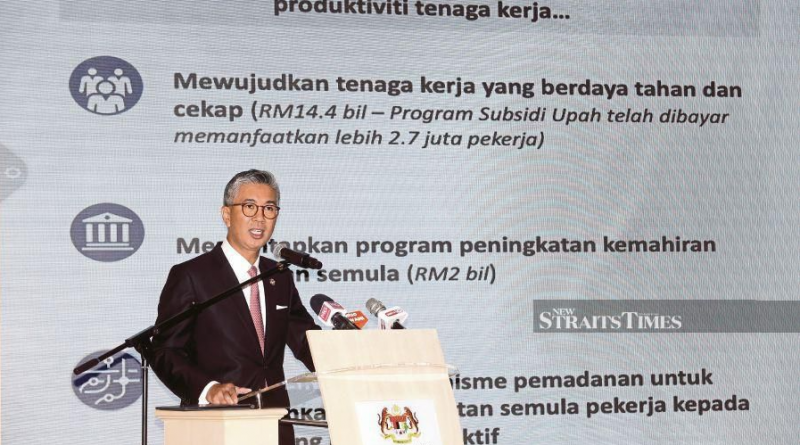Govt to tap RM5bil for Covid-19 vaccines from national trust fund
PUTRAJAYA: Malaysia will tap RM5 billion from the National Trust Fund (KWAN) to expedite vaccines procurement to achieve herd immunity, Finance Minister Tengku Datuk Seri Zafrul Tengku Abdul Aziz said.
As of December 31 last year, KWAN assets stood at RM19.5 billion.
Of the total, RM10.4 billion was contributed by Petroliam Nasional Bhd (Petronas) and RM9.1 billion was return on investment (ROI) generated from the fund’s investment.
Tengku Zafrul said the government would use RM5 billion of the RM9.1 billion to procure the vaccines.
“The government will only take out RM5 billion from the ROI generated from KWAN and will not touch the principal amount contribution from Petronas,” he said at a press conference here today.
The government reportedly had budgeted RM5 billion for Covid-19 immunisation to speed up its target of vaccinating 80 per cent of its 32 million population by December instead of February 2022.
“The expenditure is only limited to procure the vaccines and not for other development purposes, which was not enacted under the KWAN Act 1988,” Tengku Zafrul said.
He said the government had resorted to the KWAN emergency reserve because of the economic and health crises.
Established in 1988, the fund conserves the country’s wealth from oil and other natural resources for future generations.
Tengku Zafrul said the initial estimate of RM3 billion to buy Covid-19 vaccines was not included in 2021 Budget.
“The government has confirmed the Covid-19 immunisation budget of RM5 billion to speed up its target of vaccinating 80 per cent of its 32 million population by December instead of February 2022.
“During the tabling of 2021 Budget, I have informed that the government would allocate about RM3 billion for the National Covid-19 Immunisation programme.
“However, the cost was not allocated in the 2021 Budget of RM322.5 billion,” he said.
In March 2021, the government added RM2 billion to the immunisation programme to speed up the inoculation of the population.
Tengku Zafrul said vaccination was the key exit strategy for economic recovery, emphasising that the main objective of KWAN’s establishment was to protect the future’s generation.
“There was no right way to protect the rakyat, except via vaccination to achieve the herd immunity.
“We have to balance between the short and long-term sustainability of the country’s economic recovery.
“We must win against the war on Covid-19. We cannot afford to have another around of Movement Control Order. Or else we will be at risk,” he said.
Tengku Zafrul said the government had limited fiscal space and financial constraint in weathering the pandemic.
This was due to legacy debts of over RM1 trillion, arising mainly from 1Malaysia Development Bhd, SRC International Sdn Bhd and private finance initiaive.
The government is saddled with over RM20 billion a year to repay its total liabilities for the next five years.
“These liabilities commitment supposedly should be spent for the rakyat’s needs such as the vaccination programme,” he said.
Tengku Zafrul said the government did not want to burden the future’s generation with excessive debt.
“Covid-19 is the most unprecedented crisis in our history. Hence, it is reasonable for the government to tap RM5 billion from KWAN to procure vaccines.”
Tengku Zafrul said Malaysia’s fiscal deficit would likely reach 6.2 per cent of gross domestic product (GDP) from the targeted 6.0 per cent this year if the government did not utilise RM5 billion from KWAN.
He added that the government’s statutory debt level was nearing its 60 per cent limit, at 58 per cent of GDP.
He said the government would replenish KWAN, adding that Petronas should not be the only contributor.
“We hope other groups can contribute to KWAN such as those who benefited the most from the country’s natural resources,” he said.
Tengku Zafrul the government was fully justified in response to various criticism over KWAN’s fund utilisation.
“Even before the amendment of the act, it allowed the use of the money for an emergency.
“However, the fund was not meant for operational expenditure but rather for development expenditure,” he said, adding that previously it could only be used to build a hospital but now expanded to procuring vaccines.
Source: NST

